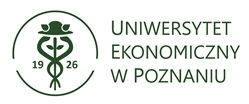Department
General information
Department of European Studies (the Institute of International Business and Economics) led by Professor Ida Musiałkowska, coordinates specializations: Sustainable global economy (Bachelor level) and Enterprise and Economic Diplomacy in Europe (Master level), within the International Economic and Business Relations programme. Most of the actions taken today in business, politics, government, media, education and culture should take account of the international context, and in particular the European context. Studies at BA level prepare graduates to understand economic megatrends and provides knowledge and skills and abilities to conduct business in the context of global climate transformation. Studies at MA level produce knowledge on the Functioning of the European Union and its institutions, its member states and companies operating in the EU single market. Students also become familiar with the contemporary international environment, focusing in particular on the knowledge and skills necessary for the European labor market. Studying at our specializations facilitates extensive and current collection of the Main Library and the Library of the University of Economics Centre for Documentation and Research European Union. European Studies students have the opportunity to complete part of their studies abroad, including European universities in the U.S. and Canada, Asia. During the studies at PUEB it is also possible to obtain the so-called "double degree", i.e. diplomas of PUEB and partner universities.
The aim of study is to prepare:
- entrepreneurs and employees of companies successfully competing in the Single European Market
- specialists working in the EU institutions and international organizations,
- specialists in national and local government administration in the field of European integration and cooperation with the EU institutions,
- consultants, specialists and trainers in the field of sustainable development, European integration and the acquisition of funding,
- diplomats,
- journalists who specialize in sustainable development as we as in European integration.
Particular emphasis in the study program is placed on skills to prepare for employment in business, consulting widely understood and managed. Our graduates know how the European and global markets, they know the business models, marketing techniques, know how to manage the finances of the company, how to obtain and properly utilize funds from EU programs and how to apply for venture capital. Get to know the insurance market and the basics of banking. They know the kind of work in the institutions (procedures, lobbying, diplomacy), and national and local government in Poland, diplomatic protocol and know how to communicate and prepare business correspondence in foreign languages. The realization of the objectives of education provides an excellent staff. These are qualified professionals in the field of business development, EU funding and the functioning of the European Union economy and institutions (competition policy, regional, industrial, spatial development, the common market, Economic and Monetary Union, climate policy, CSR and environment protection) often combining theoretical knowledge with practice and scientific activity.
The thematic areas of selected objects:
- How does Europe work? Selected items: theory and practice of international integration, European integration, European integration law, decision-making system in the EU, cross-border cooperation, infrastructure integration process, the EU budget (revenues, expenses, and structural aid funds), Economic Policy and the countries of the European Communities, International Relations economic, industrial and agricultural policy, regional policy and EU aid funds, EU relations with the countries and markets in developing countries.
- How to run a business in European Union? Selected items: Macroeconomics, Microeconomics, Principles of Management, Principles of Marketing, Statistics, Accounting (and European accounting standards), Enterprise in the Common Market, competition and consumer protection in the EU, tax systems and their harmonization with the EU, financial analysis of foreign operations.
- How to manage a modern state? Selected items: Civil Law, Commercial Law, Managing the public sphere in the EU, international political relations, contemporary political systems, international organizations.
Methods of Teaching / Form of teaching:
- Lectures by eminent experts in the field,
- Multimedia presentations,
- Interactive group exercises and individual,
- Consultations with practitioners,
- Computer labs,
- Workshops,
- Strategy games,
- Simulations,
- Case studies,
- Seminars.
Areas of study
The main areas of research in the Department consists of four interrelated research areas relating to:
- theory and practice of regional and local development (research areas of concern, in particular Polish - German
- EU integration processes, especially in the field of regional policy and structural funds, competition policy and the functioning of the common market,
- Consequently, Polish integration with the European Union in the context of social, economic and spatial
- optimum currency areas.

